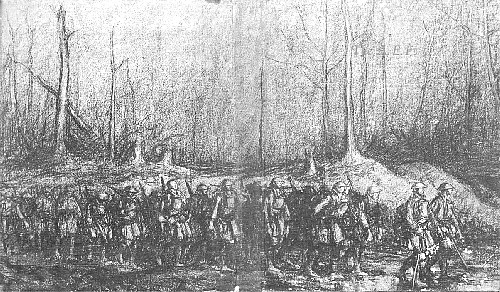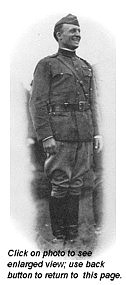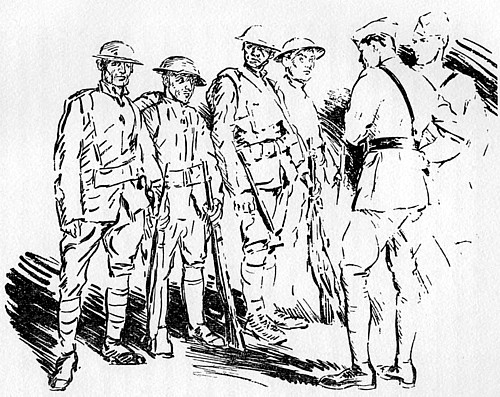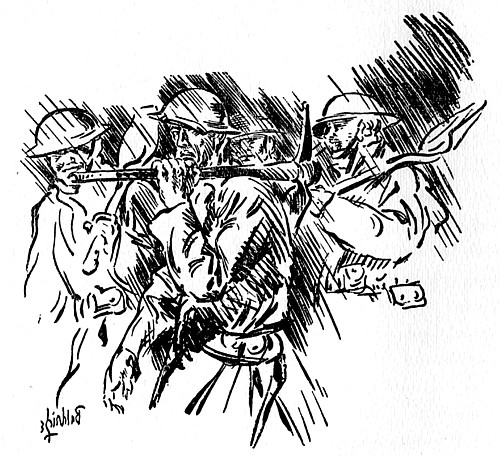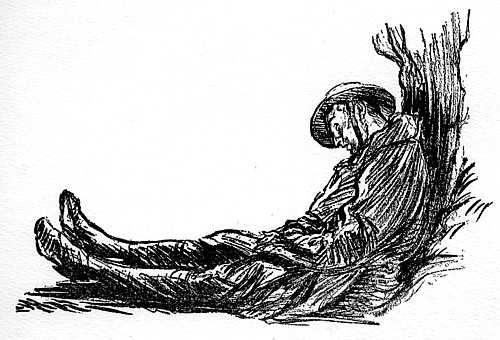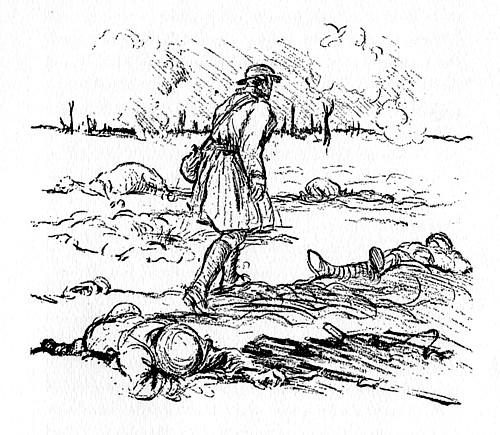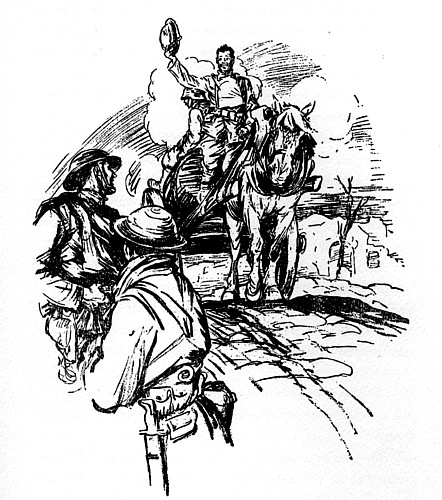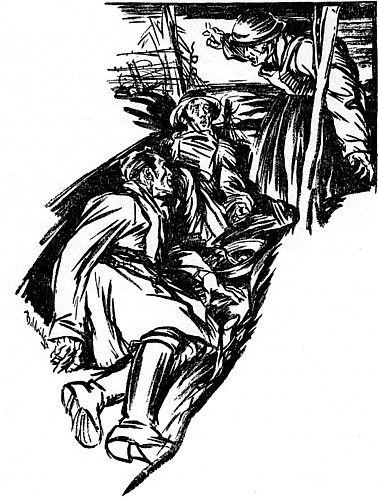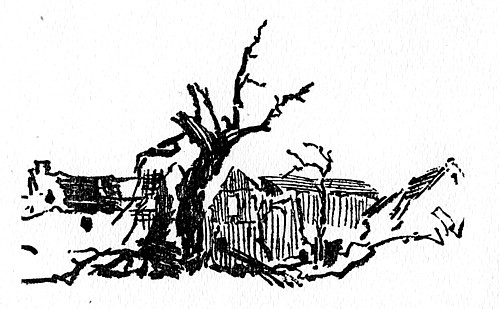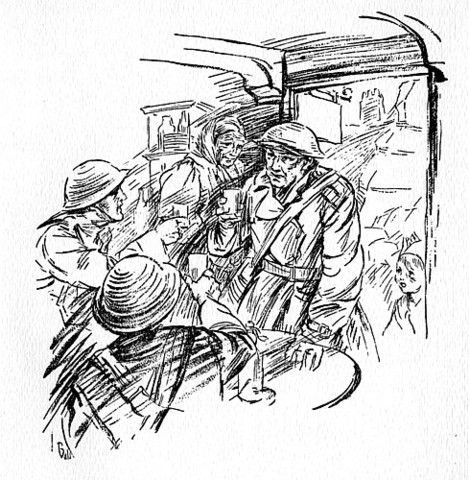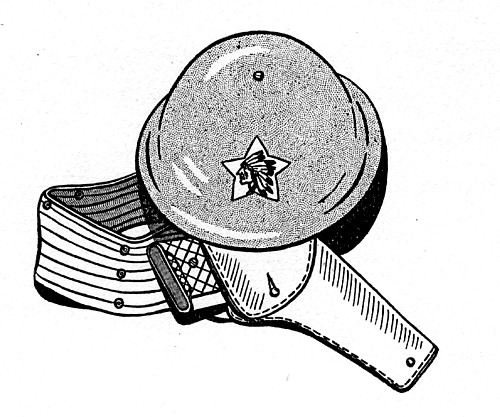Cerro Gordo County Iowa
Part of the IaGenWeb Project
War Hero ~ Lt. General Hanford MacNider
1889 - 1968
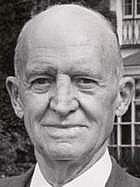
Hanford "Jack" MacNIDER, a self-styled "Iowa farm boy," was destined to lead men in battle. His military contributions made him one of Iowa's best-known war heroes.
MacNIDER was born October 2, 1889 in Mason City, the son of Charles H. MacNIDER, a well-off banker, and May HANFORD MacNIDER. Their son attended Milton Academy in Milton, Massachusetts, and graduated from Harvard University in 1911. He returned to Mason City and worked as a clerk in his father's bank. MacNIDER became a Master Mason in 1912, rising to penultimate (32nd) degree, called Sublime Prince of the Royal Secret. Throughout his life, MacNIDER kept his Masonic ties and his connection to Northwest States Portland Cement.
In 1916 and 1917, MacNIDER served with 160,000 national guardsmen patroling on the Mexican border [Villa Expedition] and soon after that served in World War I, enlisting as a first lieutenant and emerging as a lieutenant colonel. France awarded him the Croix de Guerre in 1918.
MacNIDER was elected as Commander to head the American Legion in 1921, and President Calvin COOLIDGE appointed him assistant secretary of war. He served from 1925 to 1928 with Major Dwight D. EISENHOWER as his executive assistant. MacNIDER left this commission in 1928 to take charge of the family business upon his father's death. The MacNIDER was the general manager of the Northwestern States Portland Cement Company at the time of his death. Many of the company's out-of-state investors began making moves which would have led to the closure of the Mason City plant. MacNIDER stepped into his father's shoes, borrowed heavily to buy stock, then ousted the management. Despite his own inexperience and the time spent in litigation, he succeeded in keeping the plant open. Although it took him 20 years, some of that time during the Great Depression, to pay back all of the money he borrowed, MacNIDER'S efforts helped the company and Mason City prosper.
In 1931, he was once again American Legion National Commander. Under President Herbert HOOVER, MacNIDER served as Ambassador to Canada from 1930 to 1932, presenting himself in full-dress Army uniform. During this time, MacNIDER set the groundwork for the St. Lawrence Seaway Treaty. The extremely popular MacNIDER was even considered a possibility for vice-president at the 1932 Republican national convention.
He ran unsuccessfully for President in 1940, and turned down the Republican vice-president nomination. Joining the American First, MacNIDER was an anti-war activist until the Japanese attack on Pearl Harbor.
With the outbreak of World War II, MacNIDER insisted on being put back in uniform, commanding U.S. forces in the Pacific. He was promoted to brigadier general on August 17, 1942. In November of that year, he was wounded by a Japanese grenade as he served in the front lines in New Guinea. [MacNIDER was commanding the Buna Task Force in New Guinea. After his recovery, he was given the command of the 158th Regimental Combat Team, also known as the Bushmasters, at the Bicol Peninsula.]
MacNIDER was the Commanding General of the 103rd Infantry Divison (OR) from 1947 to 1951.
In 1952, MacNIDER declined an offer to manage General Douglas MacARTHUR'S campaign for President.
Regulations decreed that MacNIDER resign from the military at age 62, and he did so in 1951 as a major general. Post-retirement, MacNIDER was promoted to Lieutenant General. He turned down a position with President EISENHOWER'S cabinet.
During his career, MacNIDER received two Bronze Stars, two Purple Hearts and three Silver Stars, three times honored with the Distinguished Service Cross, and the Philippine Legion of Honor.
MacNIDER was also a successful businessman, serving 53 years as president of Northwest States Portland Cement Company in Mason City. He was a Scottish Rite Freemason.
MacNIDER and his wife, Margaret McAULEY [married in 1925], had three sons, Tom, Jack and Angus.
MacNIDER died of a pulmonary edema at a Sarasota, Fla., hospital, during a winter vacation on February 18, 1968. It has been said that he was interred at Elmwood-St. Joseph Cemetery, Mason City, however the cemetery office does not have a record of his interment. It is believed that he was cremated with his ashes scattered in an unknown location.
Lt. General MacNIDER was named to the Iowa Business Hall of Fame in 1876.
The A. E. F. of a Conscientious Subaltern WE WERE all up on deck early, eager to reassure ourselves about that dim land of the night before. The brightest of days, a promise France did not keep by the way, the sea the deepest of blue, the sky the lightest, and land with the white villas of gay little La Boule glistening along the near shore---all these greeted us. Our two weeks aboard the Pocahontas, nee Prinzessin Irene, became suddenly very commonplace, and the blackness of those many breathless nights at sea after we'd lost our escort, something not even worth a memory.
By HANFORD MACNIDER.
Major General of the Line United States Army Reserve
Ninth U. S. Infantryman 1918
KLIPTO
MASON CITY, IOWA
COVER DESIGN --- WALLACE MORGAN
OFFICIAL WAR DEPARTMENT FILES
ILLUSTRATIONS BY C. LEROY BALDRIDGE
FINIS-PIECE BY TOM MACNIDER
REPRINTED FROM THE AMERICAN LEGION WEEKLY, 1922-1923
~ ~ ~ ~
I. Pocahontas The very night before we had lain motionless somewhere back there with lights for the first time since we started and with no one to pipe us down---or club us if we unconsciously lit a cigarette. It seemed now that we had really been in danger then---over a supposed U-boat base, and even Dixon, who had removed his clothes for the first time aboard couldn't help but grin over that. The rest of us were loud in our chatter about never having had a twinge---an awful lie on my part for I had suffered the agonies of the damned in that crow's nest, and in both climbing and descending.
The old Colonel, who had changed his profession from preacher to soldier years ago, had been as inoffensive as he looked all the way over. The night one of the turbines went to pieces from the loving touch of the last ungentlemanly Boche aboard, he had said something dismal but that was all. Now he suddenly became very important and ordered some particularly offensive inspections to add to the already long list conceived before we ever started.
It meant the day below decks. We damned him and did them, he did them and damned us, and while we were still down in the vitals of this German lady Irene---now Indian Maiden Pocahontas---we moved in off the basin of the port of St. Nazaire and halted (or whatever a ship does) waiting for guidance.
Our trip as far as being part of a convoy was concerned had been irregular, due to our traitorous turbine, but all our sister ships were present now and one by one they were all conducted in. We alternately cheered them and cursed them as they went by---little water bugs of French tugs puffing and racing around them. Someone remembered us finally about dusk and we crept slowly through the basin entrance, crowds of French civilians, soldiers and some of our QM troops on each side to welcome us. Our band played the "Marseillaise," we cheered, they "hip hipped" and the young St. Nazairenes squealed for sous and got dimes. At last, lashed along side the "Rolling Billy" which had transported our sister regiment, we proceeded to plan for the first evening ashore. The little tables at the bright cafes down the street looked alluring. But no---Officers' call, many times repeated, and the curt information that there would be no shore leave that night for anyone. At great risk to our second lieutenancies, three or four of us modified that a little later, but the fact remains that most of the regiment stayed aboard ship that night, and with quivering pencils wrote their last shipboard letters, vaguely informing anxious families that they were now hard into the Great Adventure.
- - - - Next morning one of the proudest old regiments of our Regular Army marched down the principal street of Saint Nazaire toward American Camp Number One, band playing, colors challenging the world, formations proper enough---but with the sorriest looking troops in the world. One couldn't help but feel that the good French folk, waving and cheering as we shambled along, must have had some doubts in their minds about the abilities of these heralded "Saviors of the world."
My platoon, typical of them all, was an awful appearing troop of ragamuffins---little dark Italians in uniforms much too large and showing the signs of two weeks of constant wear, sleep and slum in a weaving shiphold. Their packs were larger than the men themselves and their rifles loomed above them, grotesquely long for such small dismal-eyed urchins. Seven of this sixty spoke English and accordingly were N.C.O.'s. Having no other qualifications they were no aid to our martial appearance. Personally, I had trouble braving the kindly stares of these good French people and hung my head, mentally at least, until we reached camp. There as we trudged between crowds of newly arrived New Englanders --- National Guardsmen --- these feelings were expressed all about us in good American. They called on the heavens to explain where such a Coxey's army came from and writhed on the ground when someone explained, "Regulars."
It hurt. Little did we know then that these little "Wops" of ours were to develop into the equals if not the peers of any American soldier---and shame us into courage like their own, when ours had left us. The "Foreign Legion," our Brigade was termed that day---but to these lads as real Americans and as inspired fighting men all America was to do grateful and astonished homage at Chateau Thierry, Soissons, St. Mihiel, Blanc Mont and the Argonne---to say nothing of the first real American victory of the war at Verdun---a tiny one perhaps but the first---when a few platoons, their first turn in the line, barraged and bewildered by English-speaking Germans in pitch darkness, not only routed but destroyed a picked German Storm Battalion. These men from the East Side of New York, with but a few months of America behind them, had been eager as volunteers to fight their new country's battles---better Americans had we known it, than most of us who bragged about it.
We braved the good-natured jeers some way and soon were strewn out searching for quarters in the Adrienne barracks. We had few real instructions but many long orders principally relating to the windward side of G-I cans, our Colonel's pet offensive. By dark the company on guard had gathered up so many men, who had celebrated the feel of land by tasting everything from innocent vin rouge up through many black bottles to Eau de Vie, that the center of camp became a great outdoor guardhouse, noisy, sick and blasphemous, but full of men very happy to be in la belle France.
Stringent orders covered all our wanderings thereafter, drills became long and effective, the policing most thorough, with the G-I cans still ranking in attention. It's remarkable how one thing can obsess a regimental commander. When we marched down to our trains a week later, we really resembled some sort of an armed force. The uniforms, soon to degenerate again in the "40 Hommes, 8 Chevaux," were clean. The G-I cans had become holy things in the Latin minds of my platoon. The Second Lieutenant who commanded them had been five minutes late to a special session of officers' call on that very subject, was in arrest as a result, seeing very red whenever the things were mentioned.
Many little French box cars received us, many little bells rang and many little whistles blew, and though we knew it not, we were off to do as our first tour of duty the dirty work for the A.E.F. --- for we had been seen, appraised and duly tagged as fit only for "work troops."
Little did the inspector know when he made his recommendations that these grubby little soldiers were to make all America proud.
II. Outremecourt THE SENTRY on Number Three and I squidged along his post---the rain in a thorough French way disregarding our slickers and reaching clear through us. The west end of the main and only street of Outremecourt was our beat, and as Officer of the Guard and still a very conscientious subaltern, I was staying by him until he could exemplify his knowledge of his Special Orders. Even the loudest language failed to evoke any reply from him though he had looked much abused. I was fairly sure that one of the Italian sergeants had given him instructions, and I wanted proof. Our Battalion Commander was an exacting old file and I didn't intend to give him any more excuse for riding me---a favorite exercise of his since we had disembarked three days before fresh from St. Nazaire but very stale from travel.
The Vosges has some strange villages, but the excuse for this one was hard to find. Some manure piles must have automatically sprung up necessitating a church and some houses to guard them. Lying on the southern slope of a very proud barren hill, its poor little stone buildings formed sort of a bulwark against the waters which flowed constantly down and would have washed away these sacred mounds---black and strong with age as they were. Here so far as we knew our Battalion was to spend the winter, training in the arts of la guerre Française; and murder was welling up in our hearts at the prospect.
All the officers of rank were Regulars and the shavetails, the flower, top men in the provisionals, from the two Plattsburgs. As we sat every evening in the low squalid kitchen which served as company headquarters, company mess and the captain's billet, the flies which deserted the sacred dumps of the village at night, blackened our mess gear, our hopes and our ambitions simultaneously.
The outdoors, no matter how wet, was better. Number Three and I after an hour's silent communion which ended in the coming of the relief, called it a day. There was no vin rouge for sale and consequently no roamers to discipline. I negotiated the wall of Monsieur le Marechal's yard, and with the help of the villainously large pile which his business had brought him gained my window and room.
Madame Blacksmith's tiny candle end was soon extinguished, the fat little bed with its red comforter was damp and smelled queerly but it was warmer than the room. The kindly lady retired so early that the bed warmer was no longer hot, but while the warmer and I fought it out with the damp straw, I pondered over many things. The village padre had asked me many questions that day. Poor devil, he must have committed some ghastly crime to get such a parish---a kindly sweet-faced old priest who spoke excellent English. Ten soldiers were billeted in his garret, and while they all solemnly assured him that they were Americans, they spoke no English, nor had they any but the vaguest of ideas about the country they seemed so enthusiastic to light for.
"Am I wrong," he asked, "or do you not all speak English in your United States? And how and why do these little men claim such undying love for a country they know so little of?"
I could but shrug my shoulders with him, and grin back at his bewildered grimaces over these "strange American peoples." But it gave me and all our other officers something to wonder at; and we all, I think, decided within ourselves that we must be poor in patriotism, indeed, considering the love and homage that these dogged, unencouraged, ununderstanding, but persistent little beggars were giving to their newly adopted land. And they were all volunteers, mind you, while our letters from home just beginning to arrive, told us of our best friends who were still wondering whether they would be needed or drafted---men whose every tradition and principle should have made them examples for such men as ours.
Another commissioned officer of our great Republic who shared this fat little bed woke me up several hours later, and reinforced by much Prunella discoursed bravely if not happily about damned France, damned rain, damned flies and everlasting manure piles. But I slept again and what other subjects he covered were lost to me, though something about the lucky and unappreciative National Army being feted at home drifted by as I sluffed off.
III. Langres THE DRILL ground at Turenne Barracks was alive with action, even though it was scarcely daylight. The misty December morning was hardly well enough along to give more than the outlines of the great gray buildings enclosing the long rectangular parade. A dozen platoons clicked their way about, changing form and direction with the sharp barks of command from twelve very serious young instructors---second lieutenants of infantry plucked out of the mud of Gondrecourt and christened unexpectedly Army School Instructors.
The Army Candidates School shared the Caserne Turenne with a battalion of Regular Infantry from a proud old outfit with a history as long as the nation's. The men were being used as work troops to Americanize Langres for the Army Schools. Here and there around the rectangle stood a disconsolate group of these infantrymen---little dark Italians most of them---watching the bizarre movements of the school platoons, the chosen men of the A.E.F. and two lieutenants, old regular N.C.O.'s looked disgustedly on. The Third Platoon of the First Company, A.C.S., came to an abrupt halt before them, laid down their rifles and trotted briskly to form a circle about the platoon leader.
"My God," said one of the old timers. "Listen," warned the other, "get this Gondrecourt stuff."
The platoon commander wasted no time. "You're rotten," he announced. "You men were picked out of the line as leaders and sent down here tagged the flower of the service. You know most of this stuff better than I do---just because some of you were in the army when I was born don't get you anywhere here. You've got to perform. Forget your old cadence, forget your old I.D.R., quit standing fast when you hear a new command, CONCENTRATE what little mind you've got on just one thing---your ambition to train one infantry platoon, take it over the top and raise hell with whatever section of Germany you happen to hit."
He raised his voice to a bellow, clapped his hands.
"Form on those pieces!"
Fifty-eight men dashed back into formation. "Pick 'em up. Stand at attention, there, damn it, always at attention. REST. One more thing. Remember this is going to be the best platoon in the American Army. Never forget it. Believe it hard enough and you will be. Port, ARMS---Squads right, MARCH---one, two, three---oh, damn it, get those heads up! ONE, two, three, four."
"My God," said the first old N.C.O., pushing back his little square fatigue cap (the A.E.F.'s first design) and mopping his brow.
"Ain't it hell?" sympathized the other. "There are twelve-year men in that bunch eating that stuff like candy---I tell you the Army's going to Hell."
"Going?" said the first man, his teeth clenched on Durham strings. "Gone, I'll tell the world."
Platoons swung by in the fast new cadence, platoon leaders dancing around them, begging, urging, cursing for improvement. Halts at obliques, backing from full step ahead, sidestepping with pieces at the port, strung out in uncompleted front-into-line movements, reversing, twos-right-abouting, whole platoons giving their own commands in full-throated unison, unheard-of gyrations which made the old I.D.R. read like Phoenician history.
Our platoon jogs by at the double, reverses itself, untangles someway, and suddenly comes to a pretty halt and stands motionless at attention.
"REST. Ten minutes from now form here with shovels, last man carries three. Inspection, ARMS. Dismissed."
The sun was trying to burn a bright spot into the leaden sky, but December in France doesn't allow such frivolity, and soon a thin, miserable rain drifted down the parade. The platoons formed again, counted, rested and stood. The third platoon was mostly old timers, and their disgust at this gay student's life showed in their weather-beaten faces. The long black moustaches of the two old guides dripped disconsolately from under their tin hats. The company commander strolled down the platoon front.
"The French officers," he announced, outlining this morning's trench work, "won't be here for ten minutes. Hold your men here and give them a talk on some useful subject."
The platoon's remarks on this---it stood at rest---were definite but mostly not to be repeated.
"Who in hell are we digging this hellish trench system for, anyway? The General Staff School, a lot of fat little colonels, are going to play war games in 'em. Why don't we stand inside---freeze us to death. I'm going to get busted back to my outfit, I tell you---just damned cussedness---wasn't that slum rotten this morning? THIS morning? Why pick out THIS morning? Why don't we chop wood? I shivered myself to sleep last night---Lord, what a country---here come the Frogs!"
"Listen, men," the platoon leader winds up his prescribed lecture, "you don't like this, none of us likes it, but let's show the world they can't give us enough ugly jobs to lick us. I know about the wood and the food---it's rotten, but it can't be worse, so it'll have to be better. One thing the K.O. rode me for last night---the saluting of this platoon. I told him you were the best in the school---he said you were superlative all right, but the other way. Let's make him say when we salute him, 'That must be a third platoon man.' Give it to 'em so hard they'll have to hand back a good one. Knock their eye out with it. Some of these old 'brass hats' in Langres haven't lifted their hands above their belt for years. Snap 'em a salute that'll make 'em think they're back at the Point. You'll be doing the whole army a favor. Make 'em like it. Make 'em say 'Ah, that damned Third Platoon again'."
Horizon blue groups began to appear around the corner of the Headquarters' building. A thousand men came to attention, a thousand French shovels and picks swung up on as many good American shoulders, clanking against the steel helmets. The leading platoon swung out onto the road to the tune of "Madelon," swishing slickers and two thousand hobnailed boots slushing in the French weather.
Strangely enough these men---mostly from the Regular units with a few National Guardsmen and some odd Marines---felt a little perturbed over having left their outfits in the line---afraid that the thing might be over before they got back---afraid that their outfit was having adventures they should be sharing---not even sure they wanted these commissions they were working so hard for. But they were cheerful and willing---despite their remarks---all of them, ready to fight the man who said their platoon wasn't the best in France. Real men---who took this as sort of bad medicine, part of their duty to their country to be done as best they could.
The "Madelon" died down and the men trudged along in silence. The tall Georgian, the platoon joker, got into action---it was a bad morning with a nasty day's floundering in the mud just ahead.
"Where do these instructors get all this pep? Cognac?" he asked the world in general.
"Naw," came the scornful answer from the next platoon. "They don't have to dig." The whole platoon laughed joyfully over that, and the rest of the march was a noisy and happy parade with a grin on every face.
"Unbeatable, these devils," thought the platoon leader. "Poor old Germany."
IV. Coupru GERMANS or no Germans---I couldn't keep awake any longer and propping myself up against a gnarled apple tree where I could command the crossroad, I promptly went to sleep.
Two days before we had prepared to relieve the First Division up Montdidier way, but just before departure, while the regiment was formally observing Memorial Day in a protesting Frenchwoman's pasture, other orders had arrived. Throughout that night we had stood ready, and all next day camions driven by dirty little Annamites had bumped us through blinding clouds of white dust in another direction. Unloaded without ceremony in a miserable deserted village we had been swept to one side by a great stream of French artillery and cavalry marching stolidly back toward Paris---and a great river of refugees, mostly old folks and children, poor, homeless people, plodding alongside wagons and ox-carts piled high with all the family treasures.
The Boche had broken through.
Orders came from somewhere toward dusk, and, though part of the camion train and one battalion were unaccounted for, we started across fields toward some vulnerable point where the German horde was expected. Not far away either---but French artillery choked what roads we found and in the deserted villages, war-torn poilus, convinced, as they assured us drunkenly, that the guerre was fini, had raided unguarded cellars and lost their outfits. A rather disheartening evening---especially as no sooner were we bivouacked for the night in a dank field than Fokkers found and promptly bombed us. Our stay was short, however, and by the time it was really dark we were afoot again---all units assembled. By the aid of a miserable little hachured map I was leading the regiment by unfrequented roads toward the Paris-Metz highway and the defense of Chateau-Thierry. A second lieutenant suddenly adjutant, I felt my responsibility keenly and the colonel had edged it up a bit with "If we get lost, remember you're to blame, and God only knows the consequences to France." I plunged along in the dark, sometimes a kilometer ahead, sometimes stumbled over by the head of the column, after throwing myself (as we all did) down to sleep through the infrequent halts.
Well, we had made it. Just before Coupru, French officers had come running at us, shooing us off the road. Battalions had plodded off in different directions with their orders to block the road to Paris. All that was left was one runner and myself, sitting on either side of the crossroads. We were Regimental Headquarters. He had slept from the beginning-and now I slept, too.
It was not for long, however. I climbed stiffly to my feet and saluted the perfectly good colonel of the general staff, who had been kicking at my feet. A huge grey limousine stood purring on the road above and a haggard little customer with two stars on his cap looked savagely out through its dusty window.
"Who are you, and what are you doing here asleep?"
"I'm Headquarters of my regiment, sir."
"Where's your colonel?"
"In Coupru, sir. Back there, sir."
"How long have you been here?"
"Since daybreak, sir. Pardon me, sir, might I suggest you run your car back a way. The Boche is on that ridge, Hill 208, and looking down on us---he sends one down here now and then."
As if to prove my point, two shells "crumped" a few hundred metres down the road, and the smoke drifted off lazily across the wheat fields.
The colonel was in the car, the car was turning about and a stream of questions were coming from its partly opened door all in the same moment. I trotted obediently alongside, answering as best I could.
"Who gave you any such orders? How did you get clear down here? What authority for taking up this position? Who's responsible for this damnable thing? Why don't you answer me, sir?"
The car was gathering speed and I still ran alongside though they couldn't hear what answers I made. So, as they distanced me, I hollered my best explanation, "The French." But they were gone---the glowering heights of Hill 208 had satisfied them better than I could---and I sat down again and slept.
V. Vaux and Bois De La Roche THE PLATOON leader of the extreme left unit was explaining why it had taken him seventeen minutes to reach his objective---easily enough understood and, in fact, remarkable considering the distance covered. In addition, the last half kilometer had been through the Bois de la Roche---choked with underbrush and reeking with gas from over a month's bombardment from our own guns. I wrote it down: "Fourth Platoon H Co. 6:17 consolidating above Railway Embankment." Seventy-sevens whined over us and now and then a big oily one screamed down into the fields behind us, and great geysers of dirt and smoke played up and down along the Paris road. The Boche was very angry but very much befuddled---he'd correct his aim as soon as our airplanes let him---but just now the air was gay with Americans roaring just above our heads, foolishly near the treetops, it seemed, as if elated at the success of this clean-cut little attack.
From early afternoon until six o'clock our artillery and heavy trench mortars had drummed in ever-increasing violence. Poor little Vaux was only a smouldering heap of rocks sending up a great column of white dust and smoke straight to the heavens. When the demolition units and the moppers up had reached it hard on the heels of the attacking infantry, they had found more of the buildings in the streets than where they belonged, and they were puzzled as how to follow out their carefully rehearsed program of Boche eradication. The German garrison was there somewhere underground, but all traces of the entrances to their lairs were gone.
It had been a pretty little operation and carried out exactly as per schedule. Gray, battalion intelligence officer, and I had preceded the attack with four of his scouts, following a little ravine which ran through the village---not so dangerous as it sounds, for we had cover. We had an excellent view of the jump-off. The leading wave came down the slope with clockwork precision, the men stepping high over the German wire, rifles at high port, descended on the town in perfect order, and disappeared into the fog of dust and smoke, reddened here and there by the rolling barrage just ahead.
A moment before we had stumbled on five Boches huddled against the ravine's bank, evidently unnerved by the terrific bombardment. I had yelled "Hande Hohe" so loudly that Gray insisted they'd heard it in Paris, and my right arm had described such frantic circles with my automatic pistol that one of the prisoners, not so badly scared as I was, had suggested that it was dangerous. The laugh that followed did us all good, and they hurried off willingly enough as the first present of the day to the battalion C.O. in Monneaux.
The operation was complete now. Hundreds of dazed Germans ferreted out of the ruins of Vaux were plodding back, hands still above their heads, and the consolidation of the new line was rapidly becoming a reality. The men were digging like good ones into the slopes above the railroad, happy over their success, but fully aware of the baptism of fire that would soon descend upon them. These lads were wonderful---it was still very much of an adventure after four cruel weeks of constant and hellish shelling from the Boche, who was much aggravated by finding them in his way across the Paris road.
Liaison was established on the left. There were Americans down on the creek bank where our new line left the railroad tracks and followed the wood edge west off toward Belleau Wood, where our other brigade---the Marines-had been writing bloody history all through the last month. These men were of our sister regiment, but they'd lost contact to the left, and the sergeant commanding them had started to investigate with me. A German jumped out from a clump of brush just before us and galloped frantically across the creek, disregarding our admonition to surrender. Here was sport for these lads who had been smouldering under his shell fire for these many long days, and he suddenly plunged into the tall wheat either hit or unwilling to risk more such individual attention. A terrific crash of Maxim fire from an old building across the field retaliated, so, assuring the sergeant that everything was as it should be, I crouched low, noted down that liaison was established at 6:42 p.m., and started to return as I had come.
A machine-gun team was setting up a Hotchkiss on the track in the center of H Company's front. The embankment was steep at this point, and there was a small clearing and a stagnant pond just below it. I had just knelt down in this friendly company and started a rough sketch of the position constituting our left flank when a murderous hail of bullets from our rear fell upon us. I was nose to nose flat on the track with a machine-gun sergeant. Steel crackled all about us, hitting the rails, flicking up dust and pebbles and now and then finding a mark among the little group. The lad next me suddenly grunted and looked up with blood trickling through his hand clapped over one eye. "A ricochet," he grinned. "Oh, boy, back to the Etats Unis." But his indignation overcame him and the sergeant and I both had to hold him from starting straight back to get this indescribable Heinie and his Maxim.
There was no help for it. The slope offered no protection, but both the sergeant and I felt very undignified. It didn't seem sportsmanlike someway, especially as the platoon leader a few yards away stood unconcernedly puffing at a cigarette. I appealed to him loudly. I never had cared for the man, for we had been thrown together a great deal before we hit the line. He never agreed with me on anything and I had felt, with the wisdom of some years' absence from college, that he was too damned collegiate. His tales invariably began, "Now, at Princeton." But right now, as I said, my appeal was straight from my soul.
"For the love of God, Rosie, can't you stop this thing? It's perforating us." A bullet sang by my nose and I cracked my helmet on a rail involuntarily, so his answer was lost. But a great crackling of grenades and Germans howling repentance announced our deliverance. We got up slowly and with our fists brushed the dust out of our eyes.
Knott, the platoon leader, grinned horribly and I glared at him (I ranked him a few files).
"Why didn't you get down, you nut?"
"No use," he said, "just as big a target. Anyway, he was fascinated with you." A big boy screeched into the woods just behind---the old Boche was bracketing this corner probably---and I suddenly felt the urge of getting all this valuable information back to regimental headquarters. Another roaring bouquet from Fraulein Krupp lit squarely on the track fifty metres from us---I was now well under way.
"Count those, Rosie! I yelled back over my shoulder. I’ll see you when they lug you by."
I was too far away to hear his answer---it was probably good, but he waved cheerfully enough and sauntered up the line to see that his men were all under cover, for the Boche gunners had the new line and there was, of course, the inevitable counter-attack forming up somewhere out in front.
VI. Soissons "WHOA! we seem to be home."
The little machine gun Ford stopped with a jerk, and stood engine racing and rattling, its tin insides knocked astray from many shell holed roads. I climbed over the back with musette and trench coat.
"Thanks, lad, tell Lieutenant Paul that I'm much obliged."
"Yes, sir."
The Ford started to back its way about, when suddenly a Maxim sputtered just in front and the whine of its pellets sang past our ears. We hit the road together and crawled rapidly off into the wheat, the little car's tin body resounding with the whacks of many missiles.
The greeting from the Colonel and Headquarters Captain Gill, by whose presence I had discovered the Regimental P.C., was effusive but far from cordial. Gill enlightened us.
"This is the front line, you fool. Get that damned Lizzie out of here before we all get blown to hell. How the devil do YOU get here?"---all in one breath.
We were all as flat as we could get, and at that the machine gun bullets were sifting wheat down our necks. Then as suddenly as they had opened fire, the damnable Boches stopped.
"Shall I take her back, sir?" the little driver panted in my ear. Incredible as it seemed, the Ford was still coughing and rattling its tin wings as frantically as ever.
"Good Lord, lad, you'll be shot to pieces."
"Well, we all will if it stays there," groaned Gill.
"Yes, sir," said the driver and to our surprise he sprang up, and the Ford, as if glad to leave, was scurrying down the white road through the waving wheat. The Maxims rat-tat-ed angrily but the little bus had made the crest and disappeared from view. The Village of Vierzy was getting the German artillery's attention just then ---as great clouds of smoke testified---and had no time to snipe at flivvers.
Two nights before I had been evacuated just as the division was leaving for this adventure, though the rumor had it for a rest area. My ailment had to do with violent distress in my insides, mostly caused by the many remedies of my solicitous companions-in-arms, I think, for it hadn't been violent at first. In Paris, a walking case from the Gare de L'Est, I had met an old friend, attached to the Mallet Reserve, who had whispered to me of this affair, and volunteered his company and car that I might not miss the show. I purchased some medicine of my own choosing and all dressed up in my best uniform---my striker's last tribute to a sick man---I had ridden up to and then trudged through the Villers Cotterets woods. The narrow roads were choked with trucks and artillery---wounded going one way and ammunition the other---a horrible mess.
It was, the wounded all around informed us, the worst mix-up yet---General Mangin's famous Twenty-first Corps---two of our divisions and the Moroccans---had bitten a cross section out of the Boche's army on this 18th of July. It was the start of Mr. Foch's great counter offensive---the beginning of the end.
I finally made the open fields and plugged along over the shell-torn ground trying not to see all the mangled dead, and finally found one of our batteries, whose soixante-quinzes were barking and roaring behind the ruins of an old farm. But no one knew exactly where the line was---they'd just advanced again, so these guns were firing far ahead. Two ravines, all white with clouds of phosgene, and then the Ford---blessed little buggy with a willing driver.
Our infantry had left a trail of ruin and disaster behind them. One could see dark heaps everywhere lying among the poppies and the wheat. It was a relief to see live men again. The Colonel seemed moderately pleased at my return, though neither he nor Gill could understand my leaving Paris. I couldn't now myself. I felt very sick all over. The machine gun bullets whined incessantly overhead. A bashed-in baby tank just across the road became the target for an annoying enemy battery who salvoed it first with gas and then with black and ugly shrapnel.
It seemed that the division after two nights without sleep, little or no food or water, had doubled up to the edge of that villainous wood (eight kilometres back of us now) and with the scantiest of maps and orders, executed this surprise attack. There had been real and heavy resistance all the way---hand to hand fighting, and nasty work with machine gun nests, even direct artillery fire (whose gunners paid for it). No fun for anyone except our artillery, who had galloped across the fields in regular Civil War style, unlimbered, fired, limbered up again to catch up with the wild and angry rush of the infantry who more than once had tangled with their own barrage in their insistent haste to get the old Boche. There were wonderful tales---our Brigadier ahead of his first line mauling Germans---heroic stretcher bearers with the leading waves, medicos blood from head to foot working without rest on Germans and their own men alike just behind the advance. Men from thirty-four different German regiments went through our Regimental First Aid that day---it gives an idea of the havoc our men had played with the Army of the Crown Prince. The Colonel told me all these things and many more not so pleasant to hear, for most of the Regiment lay behind us in the wheat. But we were on our last objective, he said, and there were not enough men to do anything more. Lieutenants were commanding battalions and battalions were only pitiful remnants. What there were formed a little line a few metres ahead---well dug in as only sorely shelled men can dig in. But the Boche---where no one could see, for there was nothing but flat waving wheat before us---allowed no movement to pass without individual and prompt attention. Behind us through the broken fields crawled the plucky first-aid men ministering help where they could, but no man could be carried off until dark, and for some that was to be too late.
There were messages to be tried occasionally and the never failing signalmen actually had a bamboo wireless in operation a few metres back. Telephones were no good, for wires were cut faster than the breaks could be found. Cheerful enough---all these men who were left, though their buddies were gone and their eyes had seen hell in all its phases during the last few hours.
It was full daylight again---the German guns were tearing away at poor little Vierzy and I couldn't help but shudder when the thought of all those helpless wounded lying about the First Aid station came back to me. Our artillery began a great rising tattoo, and great tanks wobbled out ahead on our right, lurching as their 75's spotted some Maxim nest and belched out destruction. Then we could see thin lines of men---our only unscathed regiment, the Sixth Marines, going over through the division's right. We could see men falling, plunging through the wheat. Then they were lost to sight. Our men cheered them faintly---it was a hard thing to watch after yesterday.
The day wore on, the drum fire increasing in steady waves until the Germans evidently fearing a further advance began pulling their guns back---at any rate they suddenly left us alone. Even the Maxims stopped sputtering and one could stand up and stretch. But this respite was not for long. Great red-nosed black-winged Fokkers---looking for all the world like bloody headed buzzards---flew down upon us in short but never-ending circles and raked our lines with fire. There were no Allied planes to interfere. They had been around before but never so close and the things are hard to get used to and impossible to hit with rifle fire. Now they drove us all nearly frantic with helpless rage.
One amusing thing did happen in this miserable day. A poor little duffer with a hole drilled clear through him had sunk down near by and Gill had propped up his head a little. There was nothing more we could do until dark, but give him a drink now and then. He lay there uncomplaining all through the sultry day, very grateful for any little attention we gave him, even refusing to put on my mask after I had caught myself putting it on and shamefaced offered it to him. There came the great whine of a 155 sirening down on us and we all gripped the ground, and waited for the hours it seemed to take to arrive. Nothing happened. Then a thud and a heavy impact that lifted us nearly off the ground. Slowly, we raised our heads, expecting we know not what, and looked squarely into the nose of the shiniest shell in the world---it had hit somewhere ahead, bounded a bit and here it was. The Colonel and I were lying close and we turned astonished eyes on each other.
"I don't believe it," he said finally, arising with an old red blanket draped around him. His helmet was off and his white hair shining in the sun. He looked at it carefully, laughed---
"No, sir, I don’t believe it."
I heard a groan beside me and there was our wounded boy flopping his hands on the ground. His eyes were closed tight but he opened them and grinned feebly up at me.
"What's the matter, old man?"
"Oh, oh,"---for every word hurt him. "Oh, Lord, what a face you made, funny face." And we all felt better after that laugh.
The remnants of the Legion Etrangere had been drifting by on our left since the middle of the afternoon, and they had informed us that we stood relieved. The Scotch---or some good people---were closing in from farther ahead. And sure enough up lumbered a soup kitchen at dusk with confirmation and orders and something wonderful and hot.
We started back, a willing column but only a shadow of the great regiment of the day before. And the Boche to do the thing right, hung above us in a fleet of planes first lighting up the whole earth with great green chain lights and then bombing the column on the road. Phosgene hung white and heavy in every ravine we passed through, and we were almost at a double when we finally hit the friendly cover of Villers Cotterets woods again. No one knew what this affair had been about but we all thanked our God that we were out of it. Our "Y" man stood just inside the dark of the wood handing out cigarettes and chocolate and wonderful thing---Paris papers telling us that the master stroke had been delivered and the Boche was started on his great retreat. How the "Y" man had done it---we never thought---nor even stopped to thank him.
I was sent ahead to turn the columns at a crosssroads---and when the leading outfit, still stepping fast after an all night's march, came down the road---it was all that was left of my old company---about forty of them.
"There's the Adjutant," hollered my old Sergeant. "Wonder if he knows where we're going."
"Lost again!" came the regular cry and these men just through hell and out again laughed and waved as they went by.
These men of ours---the wonder of them.
VII. The Romp of St. Mihiel ALL DAY long we plodded up and down over the hills, carrying out what seemed to be only a rather tiresome field maneuver.
The show had started bravely enough sometime in the middle of the night. Our artillery had roared in ever-increasing volume and, finally assured that the Germans were not going to retaliate, we had climbed out of the mucky trenches of Limey to watch the fireworks.
A hard working detachment of the Gas and Flame were capsizing GI cans of melted tin and flaming chemicals into the enemy front line, and great geysers of gay colored flame rose and fell in the edge of the little bois across from us. A splendid show---and it gave us time for proper disposition of units deranged by all of us trying to share the same communication trenches in the dark and rain of the early evening on the way up.
We stepped solemnly out at H hour over the low wire before us with only desultory bursts of Maxim fire from a few isolated enemy posts to interfere. Our regimental area unhappily was entirely blocked by the compact little wood before us, and as the edges seemed to be whistling ominously from Boche gunners farther back, we were soon swallowed up in this dense little forest. Cluttered with trenches and barbed wire, it was practically impassable, and when a couple of big boys came screaming down into it the second lieutenants, most of them fresh from the Third Officers Training Schools, and all brand new since Soissons spoiled our list of platoon leaders---decided perhaps they'd better go back and straighten things out.
When three battalions try to untangle in the midst of a heavily fortified front line thicket, there's grief. When finally the error of the wrong direction had been properly explained and demonstrated and we had emerged from the front of the wood, we had to double for half a kilometre to catch up with the outfits on either flank. Rather a humiliating procedure, and we did it as fast as possible, thereby messing up completely all three battalions into a thick and unwieldy attacking line.
Finally that, too, was straightened out---we had had plenty of time during a long and uneventful promenade---and all that worried us now was the objective---the landmarks didn't correspond to the things on our hachured maps, but on we walked. When you get a field order as thick as the Bible and a bombardment that lasts all night, you have a sneaking suspicion that there's a real show ahead. One of the brand new shavetails, all reassured now that it wasn't such a wicked war, was complaining that he'd walked ten miles and hadn't even seen a German. His platoon sergeant, older and wiser, pointed to the road below us to the left. Sure enough, there were even columns of Heinies all marching along to the rear, evidently unguarded. The first waves on the left were climbing through the kitchen gardens of Thiaucourt.
Then suddenly there appeared popping upright in the brush before us a very small, very dirty little Boche subaltern. He came cringing toward us, one hand in the air, the other loosening his Luger holster. One gun in our barrage was firing short and so B Company had sort of a V-shaped skirmish line. Plattner, in command, and three or four of us (headquarters warriors taking advantage of this peaceful affair to be front-line soldiers) were on the far advanced flank.
"Go get him, Schwartz, and ask him where do we eat!" yelled Plattner. The runner started forward, hand out to receive the Luger and to take the little Boche in charge. Heinie, now sure of his welcome, galloped toward him, and, much to the amusement of the men, grasped the outstretched hand and proceeded to pump it vigorously up and down.
"Nein, Fritz," warned Schwartz. "Geben sie mir that gatling gun." And Fritz, scenting authority nearby, located Plattner and did a very cumbersome but proper salute.
The top of the farther bank of the Rupt de Madt appeared to be the second day's objective---home temporarily at l east---so we stopped and planned consolidation, as she says in the book. Perched on the high crest with a precipitous drop of a hundred feet behind us, we decided that this was a "hell of a place to receive a counter attack," looked longingly down into Thiaucourt to our left rear, its streets filled with men from our other regiments, and damned our luck for not being in on the loot. But, even as we watched, big oily ones began to sail one after another into the main square, crumpling down its buildings. A great cloud of dust and smoke rose from the spire of the old church. The old Boche was starting in to destroy his home of four long, unmolested years---German gratitude to the poor French civilians who were running about like chickens, enraged at Germans and Americans alike for disturbing a peaceful, harmless existence.
Then came the usual counter attack---two of them for us---with occasional bits of terrific shelling-raids and captures and a constant show of falling planes. American observation and photographic busses---anything American that could fly---went sailing bravely out in attack of anything Boche. Most of them seemed to be coming down in flames.
But there was food and many troops behind us. In fact, the only thing that marred the general good humor over this almost humorously easy conquest was the fact that artillery of a newer division, responding to calls from their more easily excited infantry, acted as if they wanted to knock us off our perilous perch---in fact, once they did---and that outfit is still unforgiven.
At such times of peril, as any good adjutant can tell you, his post is in close proximity to his colonel. That is where I found myself at once.
We were on the far side of the little valley, sitting by the wood, guessing at the next combat order, when up lumbered a captured water-cart---horse, driver and all---with a very proud doughboy on the seat directing its progress. At his command it came to a halt and, rising in his seat, he offered his prize to his regimental commander: "The thing's full of beer, sir---real Heinie beer." Sure enough it was ---we'd captured some thirteen abandoned lager-camps---and this enterprising young customer had at once requisitioned this important outfit, evidently some time before, for he was waxing eloquent.
The runners, the signalmen, the complete personnel of regimental H.Q., amounting to five---driver and colonel and all the rest---sat alongside the road and toasted the victory.
"You know, Colonel," said the driver when properly refreshed, "this is Black Jack's birthday party. I hope he's satisfied. I'm sure enjoying it."
He climbed up on the driver's seat and turned his chariot around, then, leaning across the tank confidentially, threw us back this last observation: "There's one good thing about coming to this field exercise, though, Colonel. If we hadn't been here so's we’d know better, a lot of these Boy Scout divisions would be trying to tell us afterward that this was part of the war. Good-by, sir. Giddap."
VIII. Medeah Ferme THESE SAXONS were a different breed of cats. No sooner had dusk fallen than the trees sheltering the First Battalion from the rude glances of the enemy on the hills before them, the very trees which had been counted on for protection, began to spit fire. Before the enterprising young men in field gray had been pulled down we'd had more casualties than they'd had.
The men were no sooner getting over their indignation with such unapproved warfare than there was rifle fire from the rear---not much, but enough to stampede them in the dark and make the task of sending out the proper parties of destruction a labor of exasperating delays and slow results. Two young Texan replacements had to be pried apart with a rifle before they could be reassured that each hadn't captured a Heinie red-handed.
Many strange things happened in the darkness of that night. The First Battalion spent an exceedingly nervous evening, and its commander came back three times in one hour for assurance that he was really in support, half a kilometre behind the so-called front line. He was mad because we'd told his first runner that he was in a rest area---and to lie down and go to sleep. He explained that while Regimental Headquarters on the map seemed to be as near Germany as his command, he knew full well no Regimental H.Q. ever got that near anything.
He also explained that he ranked the Adjutant considerably---whereupon being rather upset myself by the attention of a malicious young 77 overinterested in our welfare, we told him that the Adjutant was empowered to give the necessary orders, that there was no counter-attack contemplated by either army (speaking for both, as adjutants in their wisdom like to do) and that, as we had no reserves, we'd call the Paris gendarmes if he wished. He responded in kind about all gold-brickers, invited us down to the malicious nest of trouble where his troops lay, said he thought we might be interested in the war, and departed sullenly into the darkness.
We had taken Blanc Mont that morning. One battalion had been lost the night before. The French had adopted them, it appeared later, and in the mixup of an attack of which we had had no warning until its very inception, all three battalions had arrived on the objective from different angles, surprised at the meeting, as there had been no liaison or knowledge of the other fellow's whereabouts up to that point. This business of jumping off in the middle of the night undoubtedly saves one's skin, but it causes some mean guessing about the traveling ahead. After we'd got untangled and connected up properly with the brigade on the left (the whole division was in line) it had come to our attention that a lot of country behind us hadn't been properly mopped up. The First Battalion was rapidly gaining respect for these Saxon lads---quite a different species than the sleepy occupants of the hostile lines across from Marbache, our last tour of duty.
Regimental H.Q. was on the very ridge itself, a bright idea of mine because it was easy to find in the dark---right enough, that conclusion. The clump of bushes which sheltered the tiny tar-paper shack seemed well known to all the little Krupp red-legs, feverishly atoning for the loss of battery after battery of ugly 77s which lay abandoned all about us. The air was filled with H.E. smoke and chalk dust, and our beautiful hillside was rapidly taking on the aspect of a map of the moon. No fun.
Runners dodging through all this melee followed one after another to tell appalling stories about counter-attacks---always about to happen. The two beleagured battalions on the line were having a nasty time. Saxons infiltrating through the tiny patches of wood would suddenly burst forth with Maxims and grenades---and during the occasional lapses of the German drum fire we could hear sharp fighting in the ravines before us. Nasty business, and Murphy, H.Q. sergeant, and I agreed that if we were gold-brickers, as we surely were, we thanked God for it.
More runners, more threatened counter-attacks, and in the midst of it all I flopped down on my face, said all the prayers I could think of, and snored unhappily off into oblivion.
I awoke shaking violently, wondering how badly I was hit, to find some heavy body falling across me. Its hobnailed foot had planted itself squarely in Murphy's middle, and down came both of them on me. The gas officer, all out of breath, had caused all this commotion, and his sole observation after being properly righted was to gasp, "Counter-attack, First Battalion!" We explained carefully that it was evidently a continuous affair, that there was nothing to do about it, and finally, because he wouldn't be reassured, we posted him carefully out in front and told him not to awaken us until the thing arrived where we could lick it personally. And on we snored, leaving him white---as he told us next day---half with rage and half with fear.
It was just daybreak when he burst in upon us again with an agonized yell, "Here they are!"---and helmetless and bootless, automatics in hand, we tore around the edge of the trees to do our stuff as best we could. There in the half light stood about fifty upstanding young gentlemen all at stiff attention. A feldwebel or something stepped smartly out, accomplished a very stiff salute and in very correct, crisp English informed the world and the Herr Colonel that he and fifty other young Saxon freiherrs were sent back, having been feloniously captured in a cement pill box by some inquisitive American doughboy, to report as stretcher bearers-and "Bitte, where shall we go now, sir?"
Pulling together what was left of my rather shattered dignity and picking up the automatic, which had someway escaped my usually firm grip, I asked him if he and his command would not please be seated, and then, to square myself with a lot of grinning runners who had crawled out of the brush during the excitement, I turned on the anxious gas officer.
"And you, Counter-Attack Pettingill"---the name stuck to him, by the way---"and all the other gas officers, get back in that shack, curl up in the corner and dream about your happy home in the Bronx."
IX. The Singers of Ste. Menehould WE'D HAD A FEW DAYS at Courtisols---a terrible village with just one street, seven kilometres long. Trying to check up and re-equip the regiment in the villainous place had taken the tuck out of us almost as completely as the week-long show which had preceded this supposed rest. We did get some consolation out of the story of the troubles of the Marine brigade, for the French taskmasters had taken them off on a fake cruise that was giving them four days' extra marching. Our morale, however, was bobbing up and down not far from the zero mark, dependent upon the rumor of the minute.
If we had known then that some pink-panted General Staff artists had decided back in the rarefied atmosphere of Chaumont that Blanc Mont---our worst party---was not worthy of designation as a major engagement, we'd all have been too mad to move. But when the customary unheralded order of "clear Courtisols in one hour" came, we cleared---glad to get farther away from the memories of the week before. For two long days we marched, headed toward the Argonne, which, despite all the heavy fighting up there, meant little to us just then.
Late in the afternoon of the third day the column, feeling pretty sorry for itself and still gloomy over the loss of half the regiment in the last bitter squabble among the chalk hills of Champagne, came plodding down into the valley which held Ste. Menehould. The usual command of attention at the outskirts didn't straighten us up very much. The packs felt like Mack trucks planted on our backs. The sun, never appearing when it was welcome, had blazed out of a muggy sky and was giving us a last cruel slap on our grimy necks. And those British gunboats of field shoes which refused to give anywhere were receiving one of the occasional spasms of loud condemnation in my particular outfit. I had on American ones, having an able and really remarkable thief for a striker, but I was so nearly all in that I'd have agreed with any conchie right then about all wars, righteous or otherwise.
We quieted down a bit finally, having been properly exhorted, pushed our helmets straight and proceeded to enter the main square in a more or less military manner. Hobnails cracked on the rough cobbles and the combat wagons behind us clattered down the long steep hill to the accompaniment of vivid and lurid yelling from the mule skinners. The town knew something was arriving, although there was not a peep emitted from the marching column itself.
Now back in July, after what had happened at Soissons, when most of the old outfit went down in the first few hours of fast and desperate fighting, we had finally got ourselves back out of range after being relieved, having double-timed gladly most of the way.
There had been no trouble getting all of us who were left into one big farmyard, really a remarkable one. In its center stood quite the grandfather of all French manure piles. We slept where we fell that night, but most of us had staggered under some kind of cover. Luckily enough, too, because along about midnight some cropped-headed young Richthofen had dropped about a ton of Boche dynamite on us and made a bull's-eye in the exact center of that venerable pile. Some bomb---there wasn't a white spot left on any of the surrounding buildings, and the regimental Dodge, standing dejectedly in one corner, was completely buried. Only one soldat was hurt doing guard over the old frog's treasure, but it was the last straw to everyone's shattered nerves. The Boche dropped only one or two more, but the remainder of the night was pandemonium---everyone milling around in the dark cursing and hollering. To these men the loss of most of their squad and all their best buddies was enough---any bomb dropping after that was altogether too much.
So with the break of day the old man and Pinkie, then our second in command, decided that the morale of the outfit needed doctoring "toot sweet." Pinkie spent all day trying to make them sing. It would have been funny at that, had it not been for the tragic look in those hundred of Italian eyes. Pinkie was fairly round and grew crimson of face as, with sweat dripping down out of his red hair, he did valiant things to make these little Wop warriors of ours put some steam into "Good Morning, Mr. Zip, Zip, Zip," but the songfest wasn't an outstanding success. They would fight, yes, and go through hell if necessary, but damned if they could sing after any such days as those just behind them.
The remnants of the band---they were the stretcher-bearers in those days---played a bit, and when the old man in his enormous boots clumped out a weird fox trot with the medico the men grinned rather feebly, but their singing was only half-hearted. As far as that goes, they never had sung as they were supposed to in those pretty war stories---at least we'd never heard them until this Ste. Menehould affair.
Pinkie had left us back in August to take command of our sister regiment, so the men hadn't seen much of him. But as we hit the center of Ste. Menehould that day there was Pinkie---a big eagle on each shoulder, round and rosy as ever, standing in the doorway of the village Ritz to watch his old command go slogging along the road.>{? Half the leading company had tramped doggedly past before some little duffer floundering along under a tremendous pack happened to look up and spot him. At the top of his lungs in broken American he started in on "Good Morning, Mr. Zip, Zip, Zip," then quite as suddenly subsided, abashed at his own voice. You don't usually indulge in high song when you march at attention, and everyone cocked his nigh ear to hear the second looey of that platoon tell our friend about it. But at that moment we all saw Pinkie, smiling, and chuckling, waving acknowledgment to the lad and his spontaneous salute.
The town of Ste. Menehould heard a roar right then that brought the inhabitants tumbling from their doorways---and it was eyes right without command and "with your hair cut just as short as mine" at the top of all our lungs for the next half hour, long after we'd left the town or anyone could remember what it was all about. But heads were all up, packs tons lighter, British boots forgotten and the kilometres per hour had nearly doubled as a direct result.
Old Pinkie stood it pretty well until the last battalion swung into it. By the time the final platoon roared it at him---every buck smiling from ear to ear, and every officer trying to sing louder than any of them---the tears began dripping down the old boy's face. As the last man went by---he'd waved to them all---he walked inside to get away from a huge circle of open-mouthed and astonished frog soldiers, women and kids who had promptly gathered to solve this phenomenon. He sat heavily down in the little bar, and it was some moments before he could speak.
"That," said old Milo, who was with him and a bit wet-eyed himself, "was the finest tribute I've ever seen given a commander of men." The rest of us bobbed our heads. We didn't know what to say. It seemed to have all been said.
Pinkie's head was down in his arms across the little table, but he was mumbling something about "God bless 'em," his shoulders shaking just a bit. Then, with a great show of bravado, up he came, mopping his face, and let out an awful bellow: "Hey, Madame, for the love of Mike bring us all some cognac toot sweet. We're going to drink to the best regiment on earth!"
X. La Fontaine Au Cronq Ferme NOT A BAD AFTERNOON for November as someone remarked. The sun shone on the wooded caps of the hills and a lazy little breeze waved the poplars along the valley road. We were quiet enough down in the high grass that bordered the stream but there was activity before and behind us. On the slopes ahead there were men running about consolidating a position just below the crest and there was furious fighting in the two villages to east and west. We could see a dozen men race down one street and out another, men tumbling over garden walls and from one tiny town what appeared to be a whole Boche battery take flight up the hill. Men rose from the grain in front of us firing slowly and accurately and horses, caissons and field pieces piled up in heaps. To the east smoke began to rise from the cluster of houses, and we hollered encouragement as a platoon rushed to flank the Boche who were evidently preparing to leave.
Minnenwerfers were booming along the new line and the sharp hum of the Maxims, with which the woods ahead seemed to be bristling, could be heard over the sharp whine of the 77s which sailed over tearing up the forward slope of the Marines' position in support. The men were digging furiously and melting evenly from sight.
The Marine brigade and the 23rd, backed by the combined artillery of the 1st and 42nd Divisions and our own, plus a machine gun barrage of every Hotchkiss available, to say nothing of the big mouthed howitzers from the Corps, had gone over on the 1st of November and cleaned up the objectives promptly and effectively. During the very uncomfortable night that followed, our Brigade, taking advantage of darkness and rain, had marched through the outposts and broken themselves out well inside of the German lines. Their advance in battle formation at daybreak had bewildered the enemy and the opposition was slight up to this point. Here they had collected their wits and their artillery and were going to argue it out, it seemed.
I was in favor of the farm house a few hundred meters ahead---the Colonel thought it was getting too much attention from the Krupp disciples---so as motion of any kind helped, I ran up to the forward elements, got in the company commanders' way, gave a lot of useless orders (as adjutants like to do) and when finally I staggered back helping another lad carry a badly shattered battalion commander, I found the Regimental P.C. established in the farm house, according to the map "LA FONTAINE AU CRONQ." The Minnenwerfers noticed the new activity and promptly cleaned out most of the signal platoon, who were working like wild men to get connected up. That it seemed was my fault, as I had voted for the place---but colonels are always colonels, and I noticed he liked the heavy walls, too.
The southern edge of the Bois de Bel Val hissed and spat fire, and two valiant inspirations of mine to reconnoiter were very much dampened a few yards out of the farmhouse doorway. The building was coming down ---a very systematic barrage was busy at it---and we had decided for the hundredth time that day that it was a bum war and practiced asking the Old Man for a school detail or some job not so close to things.
Then came a ghastly order down from Brigade---"You will march the regiment in column of twos through the Bois de Bel Val to La Tuliere Ferme and occupy the heights south of Beaumont."
We invited Brigade Headquarters and all other "gold bricks" to come to their senses---to come up to the line and see this thing---the language was hard and picturesque---we'd never fallen down yet on an order to go forward---but what in hell---?
The Colonel, a few days out of the Air Service at G.H.Q., was strong for it---of course we knew he didn't understand. The battalions' commanders listened in silence and walked stolidly back to their men through the falling darkness. The plan was simple at any rate. It started to rain again, which would help. Perhaps the men could eat first ---"No, not time, move them out."
And in a surprisingly few moments we heard, coming down the slope to gain the road, the assembled battalions, wet and tired and wretched on their fourth sleepless day out, ready to march in column into the surprises of a heavily held enemy wood.
A "pirate" battery, from the 15th Field, came rumbling up to sandwich into the column---
"Come on, Artillery," yelled some tired buck, "we'll take you to the war!"
And the regiment filed wearily off into the night.
Distinguished Service Cross
Awarded for actions during World War I
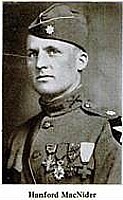
GENERAL ORDERS: War Department, General Orders No. 44 (1919)
AWARDED TO: Captain Hanford MacNIDER, 9th Infantry Regiment, 2d Division, American Expeditionary Forces, U.S. Army
ACTION DATE: September 12, 1918
CITATION: The President of the United States of America, authorized by Act of Congress, July 9, 1918, takes pleasure in presenting a Bronze Oak Leaf Cluster in lieu of a Second Award of the Distinguished Service Cross to Captain (Infantry) Hanford MacNIDER, United States Army, for extraordinary heroism in action while serving with 9th Infantry Regiment, 2d Division, A.E.F., near Remeriauville, France, 12 September 1918. On duty as regimental adjutant, while carrying instructions to the assaulting lines, Captain MacNIDER found the line unable to advance and being disorganized by a heavy machine-gun fire. Running forward in the face of the fire, this officer captured a German machine-gun, drove off the crew, reorganized the line on that flank, and thereby enabled the advance to continue.
GENERAL ORDERS: War Department, General Orders No. 44 (1919)
AWARDED TO: Captain Hanford MacNIDER, 9th Infantry Regiment, 2d Division, American Expeditionary Forces, U.S. Army
ACTION DATE: October 3 - 9, 1918
CITATION: The President of the United States of America, authorized by Act of Congress, July 9, 1918, takes pleasure in presenting the Distinguished Service Cross to Captain (Infantry) Hanford MacNIDER, United States Army, for extraordinary heroism in action while serving with 9th Infantry Regiment, 2d Division, A.E.F., near Medeah Ferme, France, October 3 - 9, 1918. Captain MacNIDER voluntarily joined an attacking battalion on 3 October and accompanied it to its final objectives. During the second attack on the same day, he acted as a runner through heavy artillery and machine-gun fire. He visited the lines both night and day, where the fighting was most severe. When higher authority could not be reached, he assumed responsibilities, and gave the necessary orders to stabilize serious situations. When new and untried troops took up the attack, he joined their forward elements, determined the enemy points of resistance by personal reconnaissance, uncovered enemy machine-gun nests and supervised their destruction.
GENERAL ORDERS: War Department, General Orders No. 12 (1943)
AWARDED TO: Brigadier General Hanford MacNIDER, U.S. Army
SYNOPSIS: Brigadier General Hanford MacNIDER, United States Army, was awarded a Second Bronze Oak Leaf Cluster in lieu of a Third Award of the Distinguished Service Cross for extraordinary heroism in connection with military operations against an armed enemy, in action against enemy forces during World War II. Brigadier General MacNIDER'S intrepid actions, personal bravery and zealous devotion to duty exemplify the highest traditions of the military forces of the United States and reflect great credit upon himself, his unit, and the United States Army.
Originally the SS Prinzess Irene, a Barbarossa-classed ocean liner, the USS Pocahontas (SP-3044) was built in 1899 by AG Vulcan Stettin, Stettin, Germany, for the North German Lloyd line. With the outset of World War I, she was interned by the United States in 1917, seized and converted into a troop transport. Throughout World War I, she carried 24,573 servicemen to Europe. Following the 1918 Armistice, she returned 23, 296 servicemen back home to the United States. Upon her decommissioning by the U.S. Navy, she was turned over to the United States Shipping Board, sold back to the North German Lloyd line, refitted and renamed as SS Bremen. She saw mercantile service as SS Karlsruhe until she was broken up and scrapped in 1932, Germany.
SOURCES:
MacNider biography photographs courtesy Library of Congress
LONGDEN, Tom. "Famous Iowans ~ War Hero Hanford MacNider 1889-1968" The Des Moines Register. October 26, 2005
en.wikipedia.org/wiki/Hanford_MacNider
coat.ncf.ca/our_magazine/links/53/macnider.html
iowabusinesshalloffame.com/inductees/macnider-handford.html
militarytimes.com/citations-medals-awards/recipient.php?recipientid=15677
en.wikipedia.org/wiki/USS_Pocahontas_(ID-3044)
Transcriptions by Sharon R. Becker, October of 2011
Iowa in the Great War (WWI)




